About
The Nanobioengineering group is a truly multidisciplinary team composed by researchers coming from very diverse backgrounds working together in applying nanotechnology for the development of new biomedical systems and devices, mainly for diagnostic purposes, and integrated microfluidic Organ-on-Chip devices for the study of organ physiology, disease etiology, or drug screening.
The goal is to fabricate microsystems containing living cells that recapitulate tissue and organ level functions in vitro and new portable diagnosis devices that can be used as Point-of-Care systems.
The main research activities of the group include the engineering and biochemical functionalization of biomaterials integrated with microfluidics systems. The bioengineered microdevices are used to study cell responses to biomolecular compounds applied to Organ-on-Chip devices, or for the development of new lab-on-a-chip based biosensors.
The projects carried out by the group are focused on clinical and industrial problems and are related to three convergent research lines:
1. Biosensors and Lab-on-a-Chip devices for clinical diagnosis and monitoring
- DNA sensors-arrays integrated in lab-on-a-chip for portable point of care diagnosis
- Vascular implantable sensors for circular cancer biomarker detection.
- Antibody-based sensors for pathogenic microorganisms’ detection and neurodegenerative early detection
- Implantable physiological sensors-array for tissue in vivo hypoxia and ischemia monitoring.
- 3D printing microfluidic technology.
- Microfluidic chip using hydrodynamic forces for cell counting and sorting. Application for detection of circulating tumours cells (CTCs).
2. Nanotechnology applied to biomolecule interaction studies and micro/nano-environments for regenerative medicine applications
- Development of bioengineered 2D and 3D micro/nanoenvironments with a topography and chemical composition controlled at the nanoscale for cell behavior studies (adhesion, proliferation, differentiation). Application to musculoskeletal system regeneration.
- Biophysical description of cellular phenomena (adhesion, cell migration, differentiation) using micro/nanotechnologies, cell biology tools and soft matter physics.
- Study of biological mechanisms at single molecule level.
- Study of magnetite nanoparticles – Amyloid-Beta interaction in Alzheimer disease.
3. Microfluidic systems for biological studies and Organ-on-Chip devices
- Microfluidic chip for blood/plasma filtering and anemia diseases characterization
- Spleen-on-a-chip development.
- Nanoporous-based systems for kidney-on–a-chip developments.
- Engineering microfluidic platforms for neurobiological studies.
- Development of 3D neuromuscular tissue models for soft robotics and clinical applications
- Microfluidic system to monitor cancer therapy response. Tumor Cancer on a chip in vitro development.
- Microfluidic vessel on-a-chip for screening drug delivery systems.
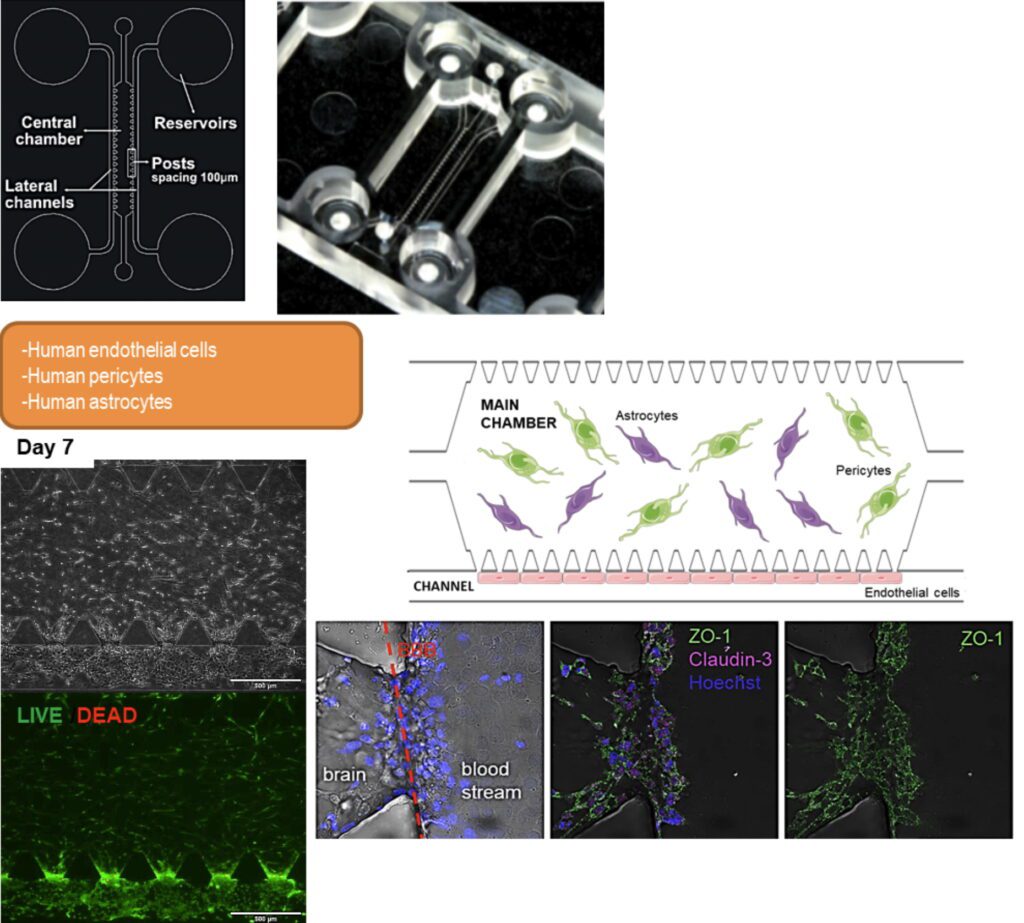
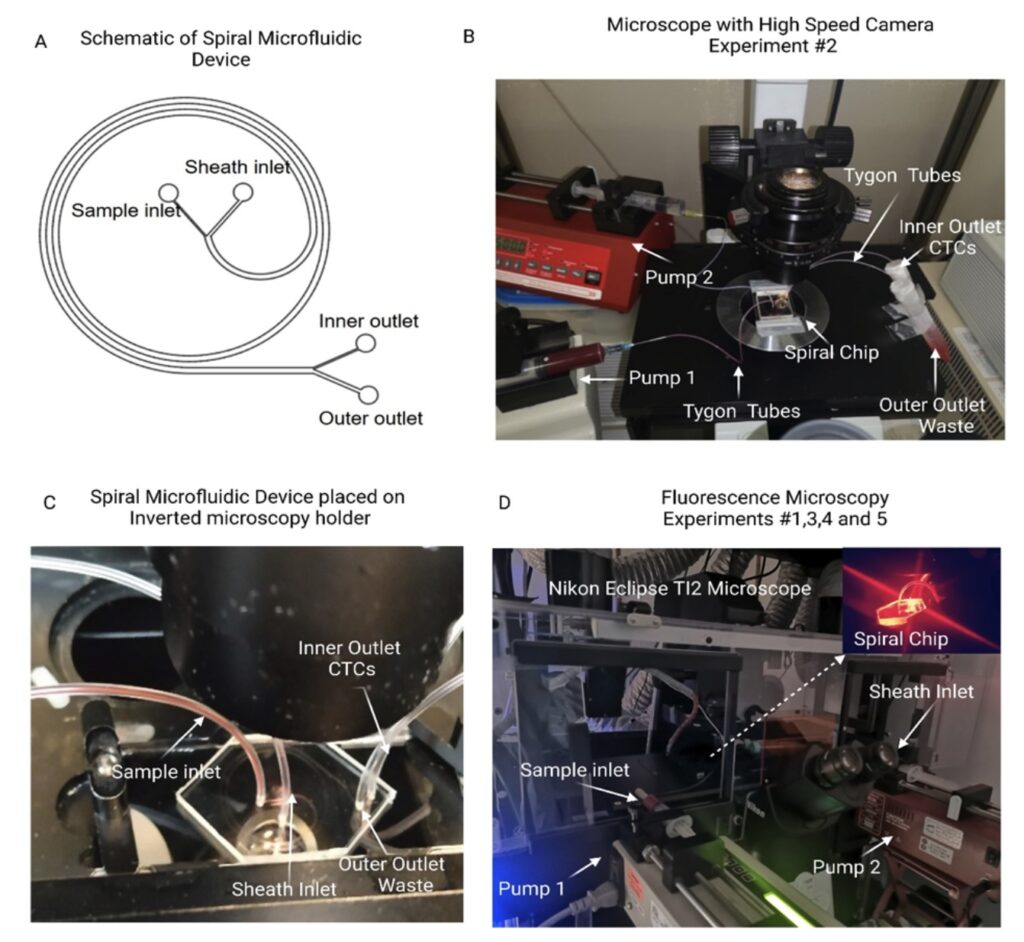
Microfluid System for Circulating Tumour Cells isolation in Blood.
Staff
Projects
| NATIONAL PROJECTS | FINANCER | PI |
|---|---|---|
| BASE3D (2019-2022) | RIS3CAT Tecnologies Emergents | Josep Samitier |
| PREMED Desarrollo de un ensayo microfluídico funcional en células para el tratamiento personalizado contra el cáncer (2019-2022) | MICIU: Retos investigación | Joan Montero |
| Sistema microfisiológico para mimetizar las barreras hemato-sistema nervioso central: aplicación a la esclerosis lateral amiotrófica (2019-2022) | MICIU: Retos investigación | Anna Lagunas |
| BATMAN Nanopartículas biomiméticas para el tratamiento dirigido del neuroblastoma pediátrico (2021-2023) | MICIU, Retos investigación: Proyectos I+D. | Aranzazu Villasante |
| Neuroblastoma en un chip para investigar la resistencia a fármacos y el uso de nanopartículas terapéuticas (2018-2022) | Asociación Española contra el Cáncer (AECC) | Aranzazu Villasante |
| Evaluación Funcional de respuesta celular a la quimioterapia neoadyuvante en Sarcoma de tejido blando (2021-2024) | Fundación Mari Paz Jiménez Casado (FMPJC), Beca Trienal FMPJC Investigación Sarcomas | Joan Montero |
| INTERNATIONAL PROJECTS | FINANCER | PI |
|---|---|---|
| ASCTN-Training Training on Advanced Stem Cell Technologies in Neurology (2018-2022) | European Comission Marie Curie ITN | Josep Samitier |
| EVIDENCE Erythrocytes properties and viability in dependence of flow and extra-cellular environment (2020-2023) | European Comission Marie Curie ITN | Josep Samitier |
| PANDORA Pandemics Outbreaks Rationalized: towards a universal therapy to eliminate intracellular pathogens (2020-2025) | European Commission, ERC – StG | Josep Samitier |
| BEST Postdoctoral Programme in Bioengineering Excellence Scientific Training (2017-2022) | European Commission, COFUND – Marie Sklodowska-Curie Co-funding of regional, national and international programmes | Josep Samitier |
| SCIFI From Scientists to Innovators for Industry (2022-2024) | EIT Health, EITHealth BP2022 Education | Josep Samitier |
| PRIVATELY-FUNDED PROJECTS | FINANCER | PI |
|---|---|---|
| Descubrimiento de nuevos marcadores terapéuticos en neuroblastoma mediante la generación de modelos basados en técnicas de ingeniería de cáncer (2021-2023) | Associació pacients NEN | Josep Samitier /Aranzazu Villasante |
| Understanding and measuring mechanical tumor properties to improve cancer diagnosis, treatment, and survival: Application to liquid biòpsies (2017-2022) | Obra Social La Caixa | Josep Samitier |
| BCNatal Artificial Placenta Project (2021-2022) | Obra Social La Caixa | Maria José López |
| Descubrimiento de nuevos marcadores terapéuticos en neuroblastoma mediante la generación de modelos basados en técnicas de ingeniería de cáncer (2021-2023) | Associació pacients NEN | Aranzazu Villasante |
| FINISHED PROJECTS | FINANCER | PI |
|---|---|---|
| Personalizing pediatric cancer treatment with kinome analyses, cell-based funcional assays and microfluidics (2017-2021) | CELLEX | Josep Samitier / Joan Montero |
| ISCHEMSURG Miniaturized electrochemical sensor for monitoring of free flap ischemia in post-surgery (2019-2021) | AGAUR | Josep Samitier |
| Joint Programme – Healthy Ageing (2016) | Obra Social “La Caixa” | Josep Samitier |
| PLANTOID Innovative Robotic Artefacts Inspired by Plant Roots for Soil Monitoring | ICT | Josep Samitier |
| Universal diagnostic platforms based on oligonucleotide cofidied nanoparticles and DNA microarray sensor devices | MINECO, I+D-Investigación fundamental no orientada | Josep Samitier |
| ELECTRA-G (2014-2016) | Conveni GENOMICA S.A.U. | Josep Samitier |
| Desarrollo de una nueva tecnología lab-on-a-chip para la detección y cuantificación de secuencias de ADN/ARN (2014-2016) | Conveni GENOMICA S.A.U. | Josep Samitier |
| BIOBOT Engineered biological soft robots based on neuro-muscular junction control (2015-2018) | MINECO, Proyectos EXPLORA Ciencia / Tecnología 2015 | Josep Samitier |
| Advancecat Acceleradora pel desenvolupament de teràpies avançades | ACCIÓ / Smart Specialization funds (RIS3) | Josep Samitier |
| MINDS Plataforma MIcrofluídica 3D de cultivo Neuronal compartimentada para el estuDio de enfermedades neurológicaS (2016-2018) | MINECO, Proyectos I+D Excelencia | Josep Samitier |
| nanoET-leukemia Nanoconductance of electron transfer proteins of the respiratory chain. Direct measurementat the single molecular level and therapeutic regulation in cancer stem cells (2015-2018) | MINECO, Proyectos RETOS 2015 / CIBER | Anna Lagunas / Marina Giannotti |
| Desenvolupar un sistema d’assistència robòtica per medicina i cirurgia fetal (2016-2019) | CELLEX | Josep Samitier |
| Monitoring neurocognitive deficits in Alzheimer’s and Parkinson’s diseases using saliva or blood-derived biomarkers and a multiplexed approach (2016-2018) | Obra Social “La Caixa” | Josep Samitier |
| ISCHEMSURG Miniaturized electrochemical sensor for monitoring of free flap ischemia in post-surgery (2019-2020) | CaixaImpulse | Monica Mir |
| Personalizing Melanoma Treatment Using Dynamic BH3 Profiling (2018-2020) | Dana-Farber Cancer Institut | Joan Montero |
| NANOVAX Nanovacunas diseñadas para inmunoterapia antitumoral (2016-2020) | EuroNanoMed (ERA-Net) | Josep Samitier |
| Understanding and measuring mechanical tumor properties to improve cancer diagnosis, treatment, and survival: Application to liquid biopsies (2017-2020) | Obra Social “La Caixa” | Josep Samitier |
| Personalizing pediatric cancer treatment (2018-2020) | Fundación FERO | Joan Montero |
Publications
Equipment
Nanofabrication and nanomanipulation
- 3D Printing system for microfluidic devices
- Graphtech
Characterization
- Potentiostates
- Optical Waveguide Lightmode Spectroscope (OWLS)
- Atomic Force Microscope (AFM)
- Optical Microscopes (white light/epifluorescence)
- Electrical Impedance spectroscopy (EIS)
- Multi-frequency Lock-in Amplifier
- Sub-femtoamp Remote SourceMeter Instrument
Molecular/cell biology
- Biological safety cabinet (class II)
- Microwell plate readers
- Protein and DNA electrophoresis systems
- Microincubator Okolab
- Nanodrop spectrophotometer
- CO2 incubator for cells: Galaxy® 48 S, 48 L, 230 V/50/60 Hz, standard
- Cell culture cabin: Bioii-Advance 3
Microfluidics
- High precision syringe pumps
- Peristaltic pumps
Collaborations
- Prof. Fernando Albericio
Institut de Recerca Biomédica (IRB), Barcelona, Spain - Dr. José Antonio Andrades
Universidad de Málaga, Spain - Prof. Ezequiel Pérez
Inestrosa Centro Andaluz de Nanomedicina y Biotecnología (BIONAND), Málaga, Spain - Prof. Joan Bausells
Centro Nacional de Microelectrónica (CNM-CSIC), Barcelona - Prof. Albert van den Berg
University of Twente, The Netherlands - Prof. Andre Bernard
Institut für Mikro- und Nanotechnologie (MNT-NTB), Buchs, Switzerland - Prof. H. Börner
Max Planck Institute of Colloids and Interfaces, Golm, Germany - Prof. Josep Maria Canals
University of Barcelona, Spain - Dr. Matthew Dalby
University of Glasgow, UK - Prof. Paolo Dario
Scuola Superiore Sant’Anna (SSSA), Pontedera, Italy - Prof. Ramón Eritja
Institut de Recerca Biomédica (IRB), Barcelona, Spain - Prof. E. Faszewski
Wheelock College, Boston, USA - Prof. G. Fuhr
FhG Biomedicine, St. Ingbert, Germany - Dr. Juan C. Izpisúa
Salk Institute for Biological Studies, La Jolla, California - Dr. Nicole Jaffrezic
Université Claude Bernard Lyon 1, France - Dr. Graham Johnson
Uniscan Instruments Ltd, Buxton, UK - Dr. Mª Pilar Marco
Institute of Chemical and Environmental Research, Barcelona - Prof. Jean-Louis Marty
Université de Perpignan Via Domitia, France - Prof. Barbara Mazzolai
IIT Center for Micro-BioRobotics (CMBR), Pontedera, Italy - Dr. Edith Pajot
Biology of Olfaction and Biosensors group (BOB) at INRA, Jouy-en-Josas, France - Dr. M. Lluïssa Pérez
Dept. Farmacología, University of Barcelona, Spain - Dr. Hernando del Portillo
Centro de Investigación en Salud Internacional de Barcelona (CRESIB), Barcelona, Spain - Dr. Jaume Reventós
Hospital Vall d’Hebrón, Barcelona, Spain - Prof. L. Reggiani
Nanotechnology Laboratory, INFM, Lecce, Italy - Prof. Daniel Riveline
Laboratory of Cell Physics ISIS/IGBMC, Strasbourg - Prof. M. Sampietro
Politecnico di Milano, Italy - Prof. Molly M. Stevens
Imperial College, London, UK - Dr. Christophe Vieu
Laboratoire d’analyse et d’architectures des systèmes (LAAS-CNRS), Toulouse, France - Prof. Pau Gorostiza
IBEC - Prof. Irene Díaz Moreno
3IIQ-cicCartuja, Universidad de Sevilla-CSIC, Spain - Prof. Miguel A. de la Rosa
3IIQ-cicCartuja, Universidad de Sevilla-CSIC, Spain - Dr. María del Mar Mañú Pereira
Josep Carreras Leukaemia Research Institute, Barcelona, Spain - Dr. Joan Lluis Vives
Josep Carreras Leukaemia Research Institute, Barcelona, Spain
Industry partners:
- Biokit S.A. (Werfen group); Genomica S.A.U. (Zeltia group); Tallers Fiestas S.L.; Enantia S.L.; Microfluidic ChipShop GmbH; Minifab; Microliquid
News
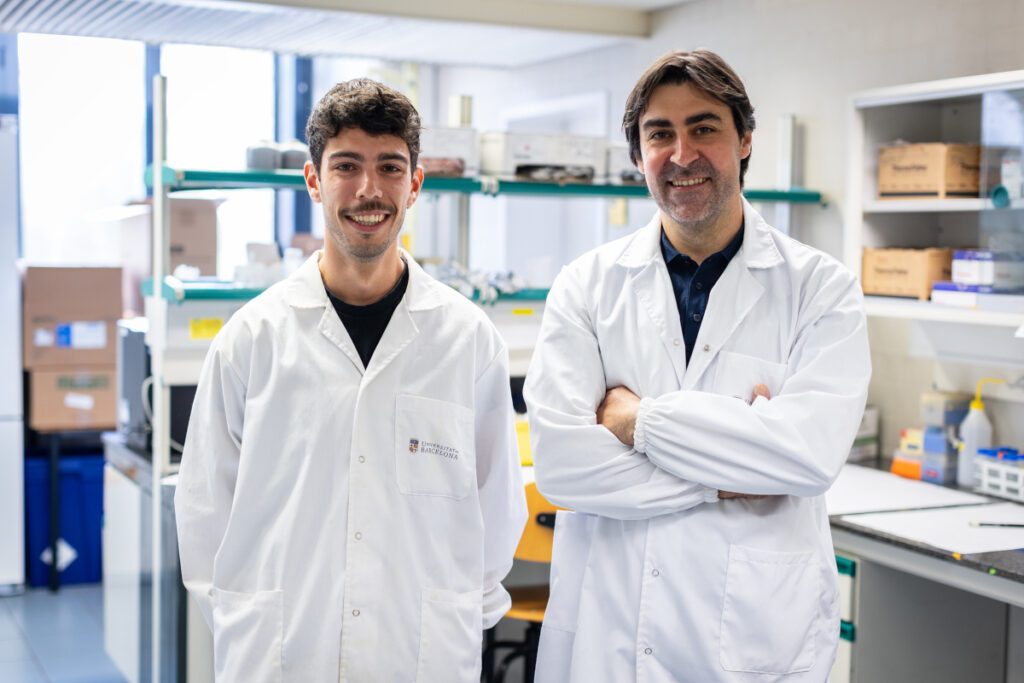
Nous avenços en la lluita contra el càncer de pulmó més freqüent
Un estudi liderat per la Universitat de Barcelona en col·laboració amb l’Institut de Bioenginyeria de Catalunya revela que l’assaig funcional dynamic BH3 profiling (DBP) és capaç de predir si tractaments específics seran efectius en aquests pacients de càncer de pulmó de cèl·lules no petites. La tècnica ajuda a determinar quina teràpia serà més eficaç provant-ho directament en cèl·lules vives, tot millorant les teràpies personalitzades.

L’IBEC participa en el MWC 2025 amb la seva innovació en salut digital i tecnologia biomèdica
Aquesta setmana s’ha celebrat a Barcelona el MWC 2025, l’esdeveniment internacional de referència en tecnologia i connectivitat. L’Institut de Bioenginyeria de Catalunya hi ha estat present donant a conèixer algunes de les seves empreses derivades, així com participant en conferències i panells sobre salut digital i transferència de tecnologia.
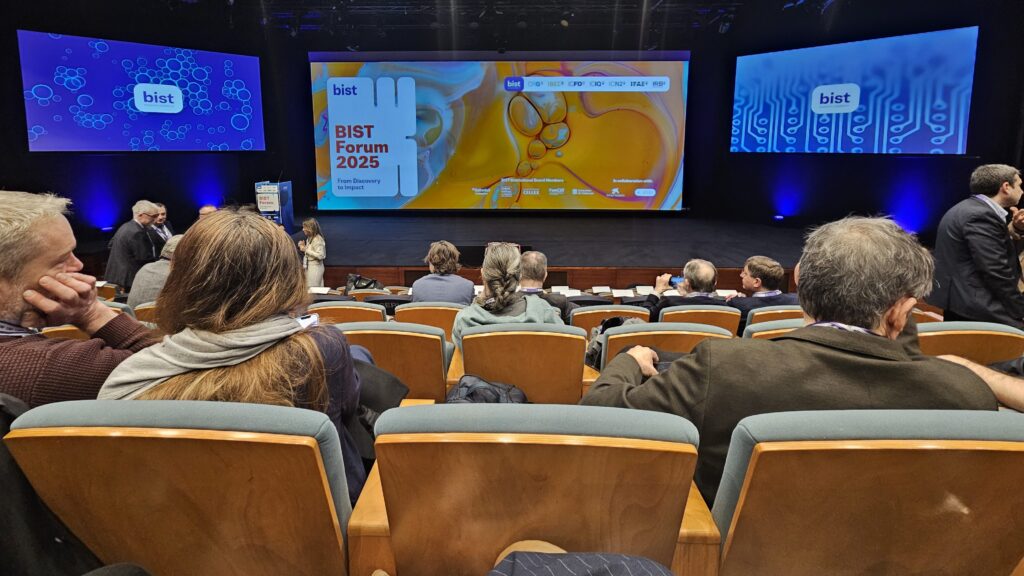
L’IBEC destaca en el BIST Forum amb 4 projectes BIST Ignite i un BIST Ignite Award
Avui s’ha celebrat el BIST Forum, un esdeveniment que reuneix la comunitat científica del BIST i que aquest any s’ha centrat en la iniciativa conjunta dels set centres CERCA per impulsar la medicina de precisió en l’envelliment saludable. Durant l’acte, s’han anunciat els nous projectes BIST IGNITE per fomentar la recerca multidisciplinària, amb la participació de l’IBEC en quatre dels cinc seleccionats. A més, un dels projectes amb participació de l’IBEC ha estat guardonat amb un BIST Ignite Award.

Laboratory Assistant at the Nanobioengineering Research Group
Ref: LA-JS//Deadline: 25/02/2025
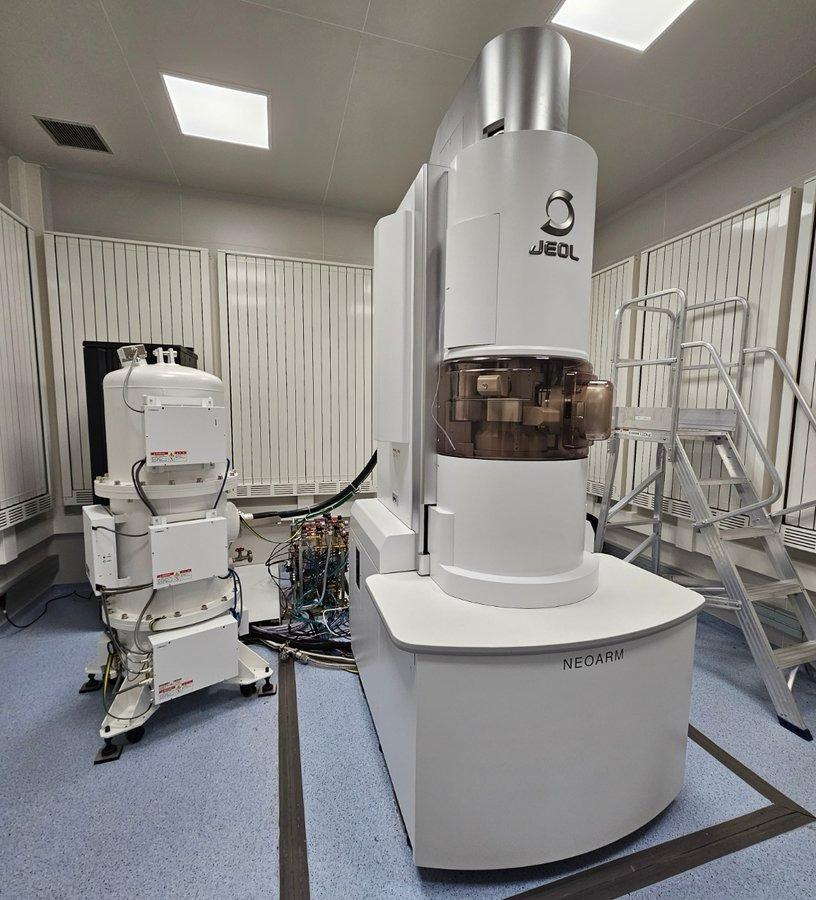
L’IBEC cofinança un nou microscopi electrònic d’última generació
El president de la Generalitat, Salvador Illa, i la consellera de Recerca i Universitats, Núria Montserrat, han inaugurat avui aquesta infraestructura singular localitzada al Parc Científic de Barcelona. El microscopi, que ha comptat amb finançament de l’IBEC i de fons FEDER*, obre la porta a la reconstrucció de biomolècules i virus en tres dimensions, entre altres aplicacions.

Laboratory Technician at the Nanobioengineering Research Group
Ref: LT_JS //Deadline: 30/02/2025
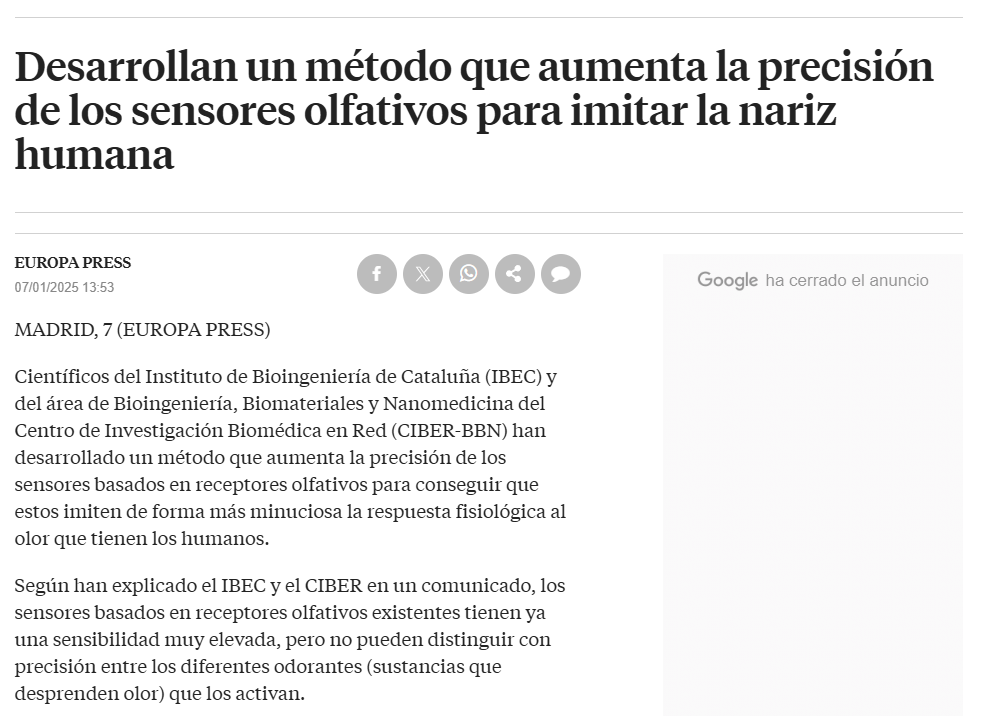
La Vanguardia: Desarrollan un método que aumenta la precisión de los sensores olfativos para imitar la nariz humana.
Científicos del Instituto de Bioingeniería de Cataluña (IBEC) y del CIBER-BBN han desarrollado un método que mejora la precisión de los sensores olfativos basados en receptores biológicos. Este avance permite … Read more

Biosensors basats en receptors olfactius per desxifrar l’olfacte humà
Un estudi liderat per l’Institut de Bioenginyeria de Catalunya (IBEC) i el Centro de Investigación Biomédica en Red de Bioingeniería, Biomateriales y Nanomedicina (CIBER-BBN) descriu un mètode que emula la resposta fisiològica a l’olor. El sistema permet distingir odorants de característiques molt similars basant-se en la interacció d’unió amb el receptor, que provoca un canvi en la resposta capacitiva d’aquest. L’aplicació d’aquesta metodologia obre les portes al desenvolupament de biosensors olfactius altament selectius.
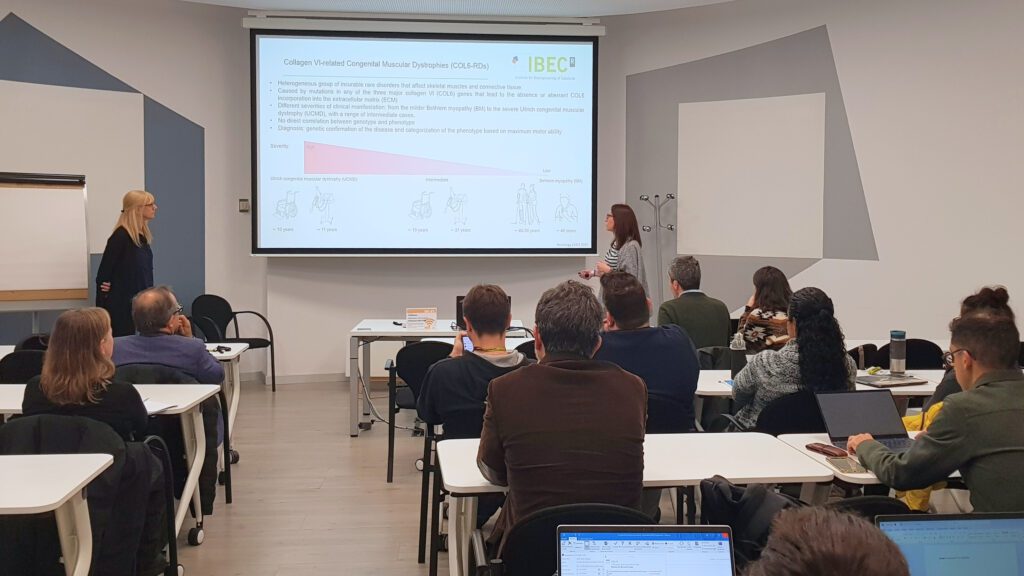
L’IBEC i l’Hospital Sant Joan de Déu reforcen la seva col·laboració amb una jornada d’innovació translacional
L’Institut de Bioenginyeria de Catalunya i l’Hospital Sant Joan de Déu han celebrat una jornada conjunta per impulsar col·laboracions en bioenginyeria i medicina translacional. L’esdeveniment, realitzat aquest matí a l’IBEC, va posar en relleu projectes innovadors, va presentar un programa de doctorat conjunt i va fomentar l’intercanvi d’idees entre investigadors d’ambdues institucions.
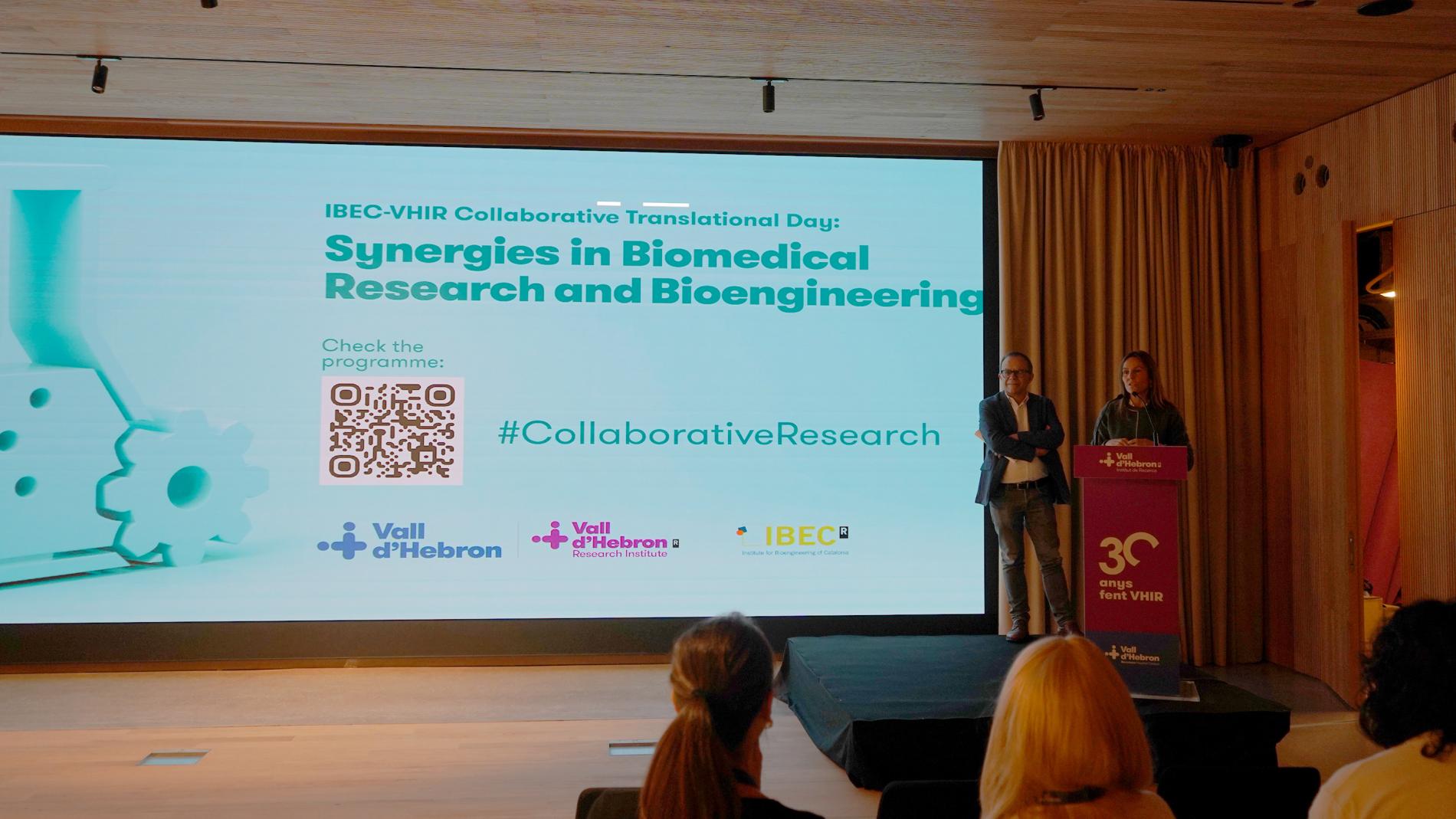
L’IBEC i el VHIR celebren una jornada de col·laboració per fomentar les sinergies
La 1a Jornada Col·laborativa Translacional entre el Vall d’Hebron Institut de Recerca (VHIR) i l’Institut de Bioenginyeria de Catalunya (IBEC), celebrada el 21 de novembre, ha estat una oportunitat per conèixer els projectes i les línies de recerca d’ambdues institucions i promoure la interacció entre els professionals.
Jobs
Laboratory Assistant at Nanobioengineering the Research Group Unit
Ref: LA-JS // Deadline: 15/04/2025
Research Assistant at the Nanobioengineering Research Group
Ref: RA-JS // Deadline: 26/08/2024
Laboratory Technician at the Nanobioengineering Research Group
Ref: LT_JS/Deadline: 22/01/2024
Predoctoral Researcher at the Bioengineering Research Group
Ref: PhD-JS_//Deadline: 30/09/2023
Predoctoral Researcher at the Nanobioengineering Research Group
Ref: PhD-JS//Deadline: 9/09/2023
Research Assistant at the Nanobioengineering Research Group
Ref: RA_JS// 28/07/2023
Tècnic/-a de Laboratori en el grup Nanobioenginyeria
Ref: LT-JS / Deadline: 15/06/2023
Postdoctoral Researcher at the Nanobioengineering Research Group
Ref: PD_JS / Deadline: 03/04/2023
Senior Technician at the Nanobioengineering Research Group (ST-JS)
Reference: ST-JS / Deadline: 17/03/2023


 ibecbarcelona.eu
ibecbarcelona.eu